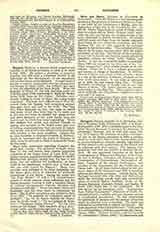

Caussin, NICOLAS, a famous Jesuit preacher and moralist; b. at Troyes in France, in 1583; d. at Paris, July 2, 1651. His father, a physician of extensive practice, was able from a competent income to aid materially in the development of the remarkable talents that his son early displayed. Young Caussin’s success in oratory, particularly after his entrance into the Society of Jesus (1609), was brilliant, and drew to him the attention of the royal family. When the kingdom of Henry IV was fast declining under the impotent sway of the queen-regent, Marie de’ Medici, Louis XIII came to the throne. Richelieu summoned Caussin to Court to direct the young king’s conscience. The task was a difficult one in those disturbed times, but Caussin, with scrupulous earnestness, gave heart and soul to the work. The king, who relied implicitly on him, was made to realize that peace would once more reign in his realm and in his own soul when he recalled the queen-mother and other members of the royal family from the banishment in which they were languishing. Richelieu disliked this advice and accused Caussin of raising false scruples in the king’s mind, and even of holding communications that savored of treachery, or that were at all events disloyal to his sovereign, with another of the royal chaplains. Caussin was at once banished to Quimper-Corentin in Brittany, where he remained until the death of Richelieu in 1643, when he returned to Paris to prepare his works for the press. Many false statements regarding Caussin’s disgrace were current. The Jansenist Arnauld claims that “it was well known from persons intimately connected at the former Court of Louis XIII, that Father Caussin considered himself obliged to tell His Majesty that attrition, arising from the fear of hell alone, was not sufficient for justification, as there could be no justification without love of God, and this was what caused his disgrace”. Many more surmises were indulged in by other Jansenists, but the reason given above is admitted by unfriendly biographers of the father. Among his works are: “La Cour Sainte” (5 vols.)—”A comprehensive system of moral maxims, pious reflections and historical examples, forming in itself a complete library of rational entertainment, Catholic devotion, and Christian knowledge.” It was translated into several languages, and has done much to perpetuate his fame. The English translation was printed in Dublin in 1815. “Le parallele de l’eloquence sacree et profane”; “La vie de Sainte Isabelle de France, soeur du roi St. Louis”; “Vie du Cardinal de Richelieu”; “Thesaurus Griecae Poeseos”. For his other works see De Backer, “Bibl. des ecriv. de la c. de J.” (Liege, 1855), and Sommervogel (new ed., Lige), II.
JOHN J. CASSIDY

